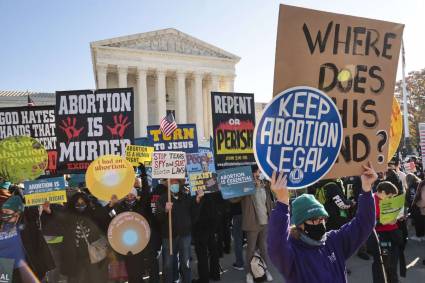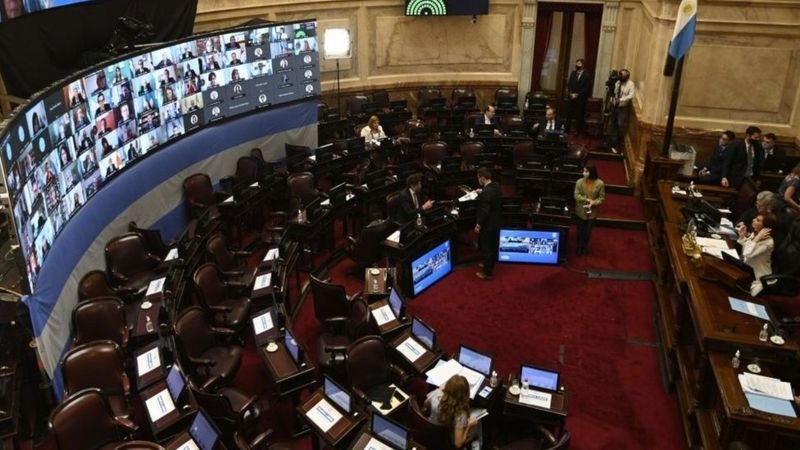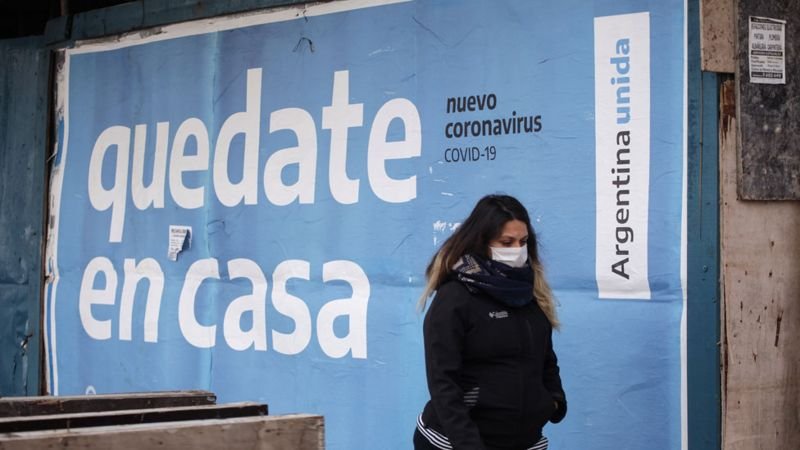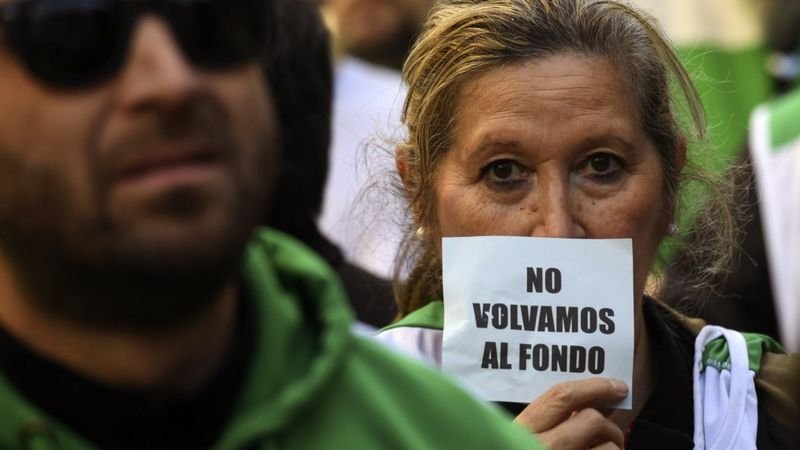Abortion 4
Dinosaurs roar in the United States


FROM THE “LEGITIMATE” RIGHT TO BUY FIREARMS TO THE BAN ON ABORTION
Dinosaurs roar in the United States
Whoever stops just for a moment to take a look at the panorama of American society in these times, will discover the depth and extension that the most ultraconservative and retrograde thinking has reached.
Translated and edited by Walter Lippmann for CubaNews.

With a population of 319 million inhabitants, there are around 310 million guns in circulation in the United States, almost one per capita. Photo: Taken from perfil.com
The President of the United States, Joe Biden, gave legal status to the agreement approved by Congress that minimally restricts access to guns.
By signing the document, Biden took a step considered by many Americans as necessary, but insufficient, on the road to putting an end to the massacres caused by the promotion of violence and the indiscriminate sale and use of firearms.
It is important to note, because of its contradictory nature, that the June 23 congressional approval of this agreement was preceded by a U.S. Supreme Court ruling that expands the right to bear arms.
The Supreme Court ruled to overturn a New York State gun ownership law, enacted more than a century ago, that placed restrictions on carrying firearms in public.
This decision may have implications in seven other states with similar laws: California, Delaware, Hawaii, Maryland, Massachusetts, New Jersey and Rhode Island.
New York Governor Kathy Hochul called the Supreme Court’s ruling “outrageous” and “reckless,” according to CNN.
It is worth noting that there are about 310 million guns in circulation in the northern nation. With a population of 319 million, that means that almost every American owns a gun, regardless of age.
A few hours after the Uvalde massacre, considered -after the Sandy Hook elementary school shooting in Newtown, Connecticut- as the deadliest in U.S. history, the National Rifle Association (NRA) held its annual convention, which was attended, among others, by former President Donald Trump and Senator Ted Cruz.
In the speeches of both politicians, highly committed to the NRA, ideologically, business-wise and, above all, politically, they criticized the Democrats’ proposal to push for stricter gun legislation.
Ted Cruz went so far as to propose increased security in schools, placing armed guards to deal with shootings.
Many interests are at work behind politicians’ support for the NRA. From the coffers of the powerful association flow the money that finances electoral campaigns, bills and vetoes against anyone who tries to limit the business.
When guns cease to be a profitable vein that finances careers and buys consciences, the path will begin to clear, the chants of death and the macabre hymn of gunfire will cease.
CONSERVATIVES CELEBRATE
The U.S. Supreme Court also overturned the landmark 1973 ruling, known as Roe v. Wade, which determined that the right to abortion was a constitutional guarantee in the United States.
Ending this constitutional right is the result of a long-standing campaign by the nation’s most backward sectors, especially conservative Christians.
After it was confirmed, Trump called the decision “the greatest victory for life in a generation”; meanwhile, former Vice President Mike Pence expressed, “We must not rest and we must not relent until the sanctity of life is restored to the center of American law in every state in the country.”
On the other side, President Joe Biden, taking advantage of the circumstances, in an address to the nation, pointed out that the only way Americans can protect abortion rights is by voting for Democrats in the November mid-term elections, reported BBC, and the leader of the Democratic majority in the Lower House, Nancy Pelosi, called the Supreme Court ruling an “insult” to women.
The non-profit association, Planned Parenthood, described the decision to overturn Roe v. Wade as “dangerous” and “unprecedented”, as it will leave 36 million women of reproductive age unprotected, according to La Opinión.
Prior to the decision, access to this right was already out of reach for many women in the United States.
“This contrasts with many countries, including those in Western Europe, which offer access to subsidized, fully funded abortion services, universal health care, contraception and broader social programs,” said Risa Kaufman, director of U.S. Human Rights at the Center for Reproductive Rights.
It should be noted that this is not just in Europe. Closer to home, Cuba, the Caribbean island labeled a “dictatorship” by Washington, was the first country in Latin America and the Caribbean to decriminalize abortion. In the Greater Antilles, abortion has been free and legal since 1961, and in 1965 the legal basis was created so that it could be performed within the framework of the National Health System.
THE COURT’S IMPARTIALITY IN QUESTION
Another ruling by the U.S. Supreme Court demonstrates the bias and ultraconservative bias that prevails in its decisions.
On June 27, the Court recognized the right of teacher Joseph Kennedy, a soccer coach at a school in the Bremerton, Washington, school district, to pray with his students at midfield after the game.
The Supreme Court ruled against the School District and in favor of Kennedy, who demanded the right to pray with his players after games at the 50-yard line. The decision significantly erodes the separation of church and state in public schools.
The school had determined that Kennedy’s practice violated the students’ religious freedom rights, and also created a security risk at the games, because the teacher had orchestrated a public spectacle by inviting the media and local politicians to attend; while Kennedy claimed that the school’s actions violated his free speech and free exercise rights.
The American Civil Liberties Union of Washington filed a brief with the Court, arguing that Kennedy’s prayers are not protected by the Free Speech Clause.
Students stated that they were forced to pray, and one player explained that he participated against his own beliefs, for fear of losing playing time if he refused.
We refer to the country that took centuries to classify lynching as a federal hate crime. For years, attempts were made, to no avail, to punish mob killings, of which people of African descent and other minorities were the main victims.
More than 4,400 African Americans were executed in the United States as a result of this practice between 1877 and 1950 alone, as documented by the Equal Justice Initiative.
The crimes were committed with impunity, often in public places and in broad daylight, and also affected, albeit to a lesser extent, other minorities such as Native Americans, Asians and Mexican migrants.
The division within the U.S. is becoming more and more pronounced; some even speak of a schism, of insurmountable polarization, of possible balkanization. The truth is that the borders between one and the other are very clearly distinguishable.
Whoever stops just for a moment to take a look at the panorama of American society in these times, will discover the depth and extent to which the most ultra-conservative and retrograde thinking has reached.
He will hear, amidst the paraphernalia of political showmanship and gunfire, the deafening roar of the dinosaurs that refuse to disappear.
The United States and its return to darkness

The United States and its return to darkness
The Supreme Court’s decision to strike down a woman’s constitutional right to reproductive freedom is just one of the revisions to be made by the highest judicial authority dominated by traditionalism and backlash
Posted: Saturday 02 July 2022 | 10:40:22 pm.
Juana Carrasco Martin

juana@juventudrebelde.cu | digital@juventudrebelde.cu
Translated and edited by Walter Lippmann for CubaNews.

A divided society: this is how they demonstrated last December in front of the Supreme Court for and against abortion. Autor: AFP Publicado: 02/07/2022 | 09:38 pm
In the 1950s, in my neighborhood in Vedado, where apartment buildings and some residences for middle-class professionals were being built on barren land and on land occupied by citadels or old houses that were being demolished, a family with two high-rise apartments was the talk of the town when their purpose was “leaked” there.
The doctor who owned the building had his private practice and clinicthere for an exclusive clientele, American ladies who were spending a “vacation on the Caribbean island”, destined to have an abortion, all as discreetly as money allowed, to circumvent the laws of her country, which prohibited that medical practice and as did the laws of Cuba.
The interruption of pregnancy was only declared free and legal in Cuba in 1961. It was a clear and fair vision of the woman’s right to decide about her body and the possibility of doing it without taboos and in a safe way for life. This was put into practice from 1965 in the National Health System. It is said that pregnant women’s mortality due to illegal and unsafe abortions decreased to practically zero.
It was in 1973 that the United States succeeded, after a judicial struggle initiated in 1970, in legalizing abortion when Jane Doe, the pseudonym used by Norma Leah McCorvey, a woman from Dallas, denounced Henry Wade, district attorney of that Texas city, to demand her right to have an abortion – she had two children and her lawyers filed her petition because she had been raped – and the judges of the highest judicial authority in the United States ruled in favor of making abortion a constitutional right.
Nearly two decades later, in 1992, that decision was reaffirmed by the Supreme Court in Planned Parenthood v. Casey in a 5-4 vote. However, the most backward segments of a deeply puritanical society, often associated with religious beliefs, persecuted medical personnel, activists and women alike for the practice of women’s free reproductive rights.
Attacks on clinics, assassinations, and individual threats, were also coupled with judicial persecution. According to data from the National Advocates of Pregnant Women (NAPW), a women’s legal defense organization, since 1973 more than 1,700 women have been imprisoned or detained and prosecuted for the criminalization of pregnancy.
Of course, NAPW is concerned about what may happen from now on, when the Supreme Court overturned the Roe v. Wade ruling, and termination of pregnancy will no longer be a constitutional right, Each of the 50 states of the Union will impose the rules and limits on pregnant women, which translates into 166 million women in the United States being in their hands and unable to make decisions over their bodies and lives.
In this summer of 2022, what was believed for 49 years to be a step forward and definitive, was cut short by the 6-3 decision of the current Supreme Court. It was tailored to the stalest mold and extreme traditionalism of a good part of American society, because President Donald Trump was able to appoint three of the nine judges, tipping the balance in such a way that leaves a legacy of right-wing thinking and decision-making power that will weigh on American society for many years, since the terms of a Supreme Court justice is for life.
Now women who need or want to terminate a pregnancy will have to travel to the “liberal” states where it is allowed or to neighboring countries such as Canada and Mexico, for example, in order to make their own decision. Some commentaries emphasize how the persecution and trials could lead them to prison, even with accusations of murder or manslaughter.
A commentary in The Hill, signed by Liberty Vittert, under the headline “The biggest danger in overturning Roe: your phone could send you to prison,” warned, “You’re scared, you’re alone and you’re pregnant. You can’t keep the baby and you want an abortion. However, the state you live in had a trigger law that automatically made abortion a crime when the Supreme Court overturned Roe v. Wade last week. You decide to have an abortion anyway at a clinic that is still doing it 100 miles from your hometown.
“Now you’ve committed a crime, and the police have a new arsenal of evidence to arrest you at their disposal. Did you use Google Maps or Waze to drive to the clinic? Police can get warrants or subpoenas to get your Apple or Google cell phone location data to see where you went and how long you stayed there. Did you stop using your period-tracking app? Law enforcement can get that data. Did you Google an abortion clinic? Law enforcement can get that data.”
Although hypothetical, not fiction as related, abortion has once again been criminalized and any action linked to it is considered a crime or offense, can be investigated, prosecuted and convicted and since the Supreme Court made its ruling final, “trigger laws” banning the medical procedure have already gone into effect in several states.
Objectively, the Supreme Court’s action has divided the nation, and demonstrations for and against it came face to face in front of the Temple of Justice, a monumental marble edifice whose quarries of provenance almost identify the current ideological makeup of the nine justices: those stones came from Vermont, liberal and politically independent-minded; from Georgia, the state that was the icon of segregation; from Alabama, which continues to recall the black belt of slavery in its cotton fields; from Spain, where Franco’s phalanx drowned a people; and from the fascist Italy of Benito Mussolini, to whom the architect builder thanked for his marble contribution.
A first step on a path of retrogression
This overturning of Roe v. Wade is only the first back-to-the-darkness ruling by the U.S. Supreme Court in a series that will undoubtedly transform the country. The warnings about this retrograde process have been coming ever since Trump began appointing conservative justices and upsetting the balance.
Already, New York Democratic Rep. Carolyn Maloney, chair of the House Oversight and Reform Committee has scheduled a July 13 hearing on the impact of the reversal of Roe v. Wade, which she called having “devastating effects” for generations. She sees it as the culmination of a years-long public campaign by Republicans to appoint a Supreme Court that would uphold draconian restrictions on people’s reproductive health care.
Naomi Klein, a leading scholar and environmentalist, asserted in an article in The Intercept that the United States is in the midst of a “shock-and-awe judicial coup,” a military term for a surprise and frightening attack that allows for quick victory over an adversary that has been terrorized by the power of force, in this case by the force of power. We cannot ignore the fact that a Supreme Court decision is not subject to appeal.
To the blow to abortion rights, Klein added the blow to gun control laws and the authority of the federal government’s Environmental Protection Agency to regulate greenhouse gas emissions from the use of fossil fuels, to the benefit of exploitative corporations, even to the detriment of the sovereignty of indigenous nations in the U.S.
It is not new and her warning that can be read in her major study The Shock Doctrine: The Rise of Disaster Capitalism [In its Cuban edition: “La Doctrina del Shock: El auge del capitalismo del desastre”, published in Cuba by Editorial de Ciencias Sociales, 2016.] On the Supreme Court’s docket there are other issues of impact, even affecting democracy itself, the right to vote, the redrawing of electoral districts and these judges do not seem to be precisely neutral….
It is clear that American democracy is deteriorating and on the part of the Supreme Court, the process is underway. There will still be much to tell and to analyze.
Argentina in the year of the pandemic

Argentina in the year of the pandemic
As everywhere else, the arrival of SarsCoV-2 has hindered Peronist management in its return; but this has not hindered a social task that has struggled to impose itself on the economic ballast during its first year in office
 Author: Marina Menéndez Quintero | marina@juventudrebelde.cu
Author: Marina Menéndez Quintero | marina@juventudrebelde.cu
December 12, 2020
Translated and edited by Walter Lippmann for CubaNews.

Alberto Fernandez believes he will be able to raise Argentina again, as he did in 2003 when he was Nestor Kirchner’s right-hand man. Author: Getty Images Published: 12/12/2020 | 08:21 pm
The debates to legalize the voluntary termination of pregnancy close the legislative year and, also, the list of relevant events noted in Argentina during the first 12 months of the Peronistas return. But the events that will most mark the life of the nation are in the economy and in society itself, at the mercy of both, like everything in this world, of the scourge and the confrontation of the pandemic.
The interruption of the pregnancy will be the last vote that the Senate will take on the 29th of this month after its approval in the House of Representatives, which could lead, if it is approved, to the fulfillment of one of the most important campaign promises of the executive that Alberto Fernandez presides over.
And although the issue is attracting the attention of defenders and detractors, it is discussing spaces in the media with the arrival, in the first two months of 2021, of ten million doses of the vaccine against Covid-19. This was negotiated with Russia through the direct intermediary of President Vladimir Putin to help a country that is accumulating more than 40,000 deaths from Sars-Cov-2, despite the efforts of the government in the care of the disease and the sick.
It could be said that the outbreak of the pandemic in March, barely three months after the arrival of the Front of All to power, has passed through his presidential administration at the beginning, to the point that the Head of State has declared that when history is written he will be remembered as “the president of the pandemic”.

The Argentine Senate also approved the Law of Solidarity and Extraordinary Contribution to Covid-19. Getty Images
Confronting the coronavirus has been much more difficult for a nation that was left, as Argentines often say, “in intensive care” by Mauricio Macri’s terms and was therefore in a worse position to face a crisis that has continued to rage.
In October 2019, still in the middle of Macri’s administration, the official National Institute of Statistics and Census (Indec) reported that poverty had risen to 35.4 percent and destitution to 7.7 percent.
That was the scenario where the restrictions imposed against the risk of contagion were primed, so that at the end of the first half of 2020, Indec reported another slight rise in poverty by five percentage points to 40 percent. Meanwhile, the price of the basic basket rose by 20 percent: nine percent more than the increase in total family income which grew by 11 points, so that families living standards continued to decline .
The substratum was visible in the macro numbers left by Macri. At the end of his two terms, inflation had escalated from 25 to 50 percent annually, the accumulated peso devaluation was 540 percent, reserves had become thinner and, worst of all, the foreign debt was equivalent to 95 percent of the GDP in a country that was not growing.
Argentina was in virtual default.
Faced with this reality, the impact of what was the biggest challenge and now also the biggest success of the new government is not yet visible: the renegotiation of 99 percent of the debt bonds held by private holders, an agreement that saved the country from default and set sail so that, despite everything, the ship would sail again.
The rescheduling of payments – as the young and talented Minister of Economy, Martín Guzmán, is accustomed to say, because only the terms have been distanced but Argentina will pay – was completed in September and, although it may have passed by in the midst of the contingencies unleashed by the Covid-19, it can be considered transcendental. Paying interest on the debt, it was impossible to think of any plan for national revitalization.

The arrival of the coronavirus added to other problems already facing Argentines. Photo: Getty Images
The payment of $66,137 million dollars of debt under foreign legislation in ten years was restructured with a deduction of around 60 percent, so that only the debts agreed to with the International Monetary Fund itself, relatively “comprehensive” now but responsible for an unpublished disbursement approved by Macri of 57 billion dollars, of which $44 billion were received. Despite its cooperation in the process with the bondholders, the Fund will try to negotiate with the government by imposing prescription books that the Argentine executive does not want to accept.
The successful negotiation with the private sector made it possible for the legislature to approve last month an ambitious and optimistic budget for 2021 that contemplates the forecast of 5.5 percent economic growth after the 12.1 percent collapse of the year that ends,. Inflation is projected to decelerate from 32 percent reported this year, to 29%; and a primary deficit of 4.5 percent, among other aspects.
Martin Guzman, who is responsible for the plan already approved by Congress, has said that this will be one of the elements he would use to negotiate a new program of extended facilities with the IMF.

The interventions of the IMF in Argentina have been popular rejected. Photo: AFP
Offering the shoulder to the people
But the benefit that some of this brings is not yet visible today, when the adversity of the economic figures has been lessened by the government with social measures, aimed at making the burden on the people less heavy.
This shouldering of the burden must be responsible for the fact that, in spite of the sorrows, the executive headed by Alberto and former President Cristina Fernández closed the year with popularity ratings that give more than 50 percent support to the president.
A neoliberal ideologue bent on discrediting him would call it “populism”; but such thinking about people is precisely what offers the nuances that differentiate the models from the socio-political point of view.
Among these measures is the Law of Solidarity and Productive Reactivation, which suspended the formula for adjusting pensions and retirement pensions, and promoted their stability. Also, there is the increase of withholding taxes on exports, the freezing of public service rates throughout the year, the creation of the so-called PAIS Tax on purchases with dollars in order to increase savings, and the increase of taxes only on those who receive more income.
In addition, steps were taken to strengthen local production chains in order to make products cheaper, and it was decided to create a food card that will monitor the nutritional quality of families.
Interviewed by the alternative media El Destape, Alberto Fernandez has confessed the rigors of governing a country that received in crisis and then has vilified the coronavirus. But he has also shown that he feels at ease.
During the last three months, income has exceeded inflation by almost three points, he said. Industries such as the automotive industry produced 20 percent more in November than in the same month last year, and reports state that “in the most popular neighborhoods, where people need it most, demand in the dining halls has fallen,” he said.
“So I say, I was not wrong.
Argentine Abortion Rights Expanded

Alberto Fernández enforces guarantees for legal abortion in Argentina
On Friday the government of President Alberto Fernandez launched measures to guarantee non-punishable abortion in Argentina
Author: Digital Editor | internet@granma.c
December 14, 2019 10:12:32
Translated and edited by Walter Lippmann for CubaNews.

Alberto Fernández, President of Argentina. Photo: AFP
On Friday the government of President Alberto Fernandez launched measures to ensure in Argentina non-punishable abortion, such as setting a deadline of 10 days to perform it, without changing the law prohibiting the free termination of pregnancy.
“The anti-rights always use any kind of arguments and even justice for not complying with the law. This is just a procedural guide or protocol. It’s public health, it doesn’t make sense to turn it into a religious or political debate,” Health Minister Ginés González García told La Red radio station.
Abortions are legal in Argentina only when the woman’s life is in danger or when the pregnancy was the result of rape.
“We are respectful [of doctors] who raise conscientious objections, but this cannot be an alibi for [health] institutions not to comply with the law,” the minister said at a press conference.
A period of 10 days is established for the performance of the abortion from the moment the Legal Termination of Pregnancy (ILE) is requested.
A bill authorizing legal, safe and free abortion was approved by the Chamber of Deputies in 2018 but failed in the Senate.
Since then, anti-abortioni sectors have intensified pressure and obstacles to comply with the non-punishable abortion law that has been in force since 1921, and there are even provinces that refuse to comply with the law.
Fernández announced that he will promote a new debate on abortion in Congress, where the pro-government bloc is the first minority in the Lower House and the president has a majority in the Senate.
The minister explailned that the protocol helps “health workers be backed by the law because in controversies [with anti-abortionists] they are frightened or intimidated.”
“The protocol says what the health teams should do, medical evaluations, what is the bibliography to consult and the medication used,” said González, who is in favor of legalizing abortion. He said the protocol complies with World Health Organization recommendations.

A controversy had erupted in November when the outgoing government of President Mauricio Macri vetoed a protocol similar to the one implemented this Friday, despite the fact that it had been signed by the former Minister of Health, Adolfo Rubinstein, who had to resign.
Non-governmental organizations claim that in Argentina there are between 370,000 and 520,000 clandestine abortions a year. (CUBADEBATE)
Subscribe to Blog via Email
| M | T | W | T | F | S | S |
|---|---|---|---|---|---|---|
| 1 | 2 | 3 | 4 | 5 | 6 | 7 |
| 8 | 9 | 10 | 11 | 12 | 13 | 14 |
| 15 | 16 | 17 | 18 | 19 | 20 | 21 |
| 22 | 23 | 24 | 25 | 26 | 27 | 28 |
| 29 | 30 | |||||

You must be logged in to post a comment.